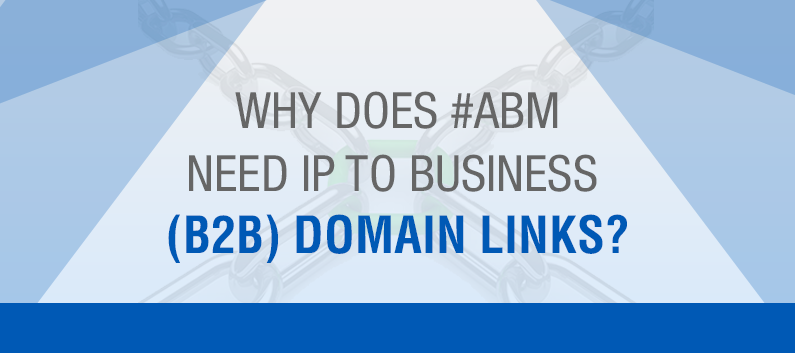
In theory, Facebook is a fantastic platform for creating or transferring custom audiences. The wealth of data Facebook holds on users, and the many options for defining...
Reverse IP lookup is a way to discern something about a company so you can sell something to them—which is all well and good. But what exactly, you wisely ask, can I do with this technical topic to drive company sales? In the second of Rick Holmes’s Technical Sessions, you will figure out what reverse IP lookup is good for and why you’d want to bother with mapping anonymous website traffic. Hint: It’s not as anonymous as you think.
First, what is an IP address? Short answer, it’s the public facing IP (internet protocol) of your machine. “For most machines,” Holmes said, “this is the IP that is displayed by your outermost router, the one facing outside of your firewall.” Your IP address is what’s displayed in most web logs for your machine. Here’s the process: you browse a page, your machine logs onto the page, it gives off your public IP address, and the web page notes where you came from and when you leave. That’s really it.

What isn’t an IP address, then?
It’s important to know that multiple machines on the same network produce very similar IP addresses. Also, some IPs are dynamic, so when you’re using Wi-Fi or coming on and off a network, you’re being assigned a new IP (which sometimes causes changes to a publicly viewable IP).
Over time, you see a big history of these IPs. This is the good part. IP addresses can be used identify both companies and households on the internet. Using IP addresses to find out information about companies falls under the topic of reverse IP lookup. Which is important, because you want to know who’s looking at your site.
For business using #abm who are selling a B2B product, you need to find out which businesses come to your site so you can show them custom displays.
“Essentially, you figure out their buyer persona so you can show them products that they’ll be interested in,” Holmes said. And if you’re a B2C brand with individuals or households visiting your site, you want to be able to follow them across other mediums. This ability has been productized more and uses more sophisticated methods than just IP. Such as, for example, full retargeting, because when we know who’s been on our site organically, we can just going to follow them and display to them later.
These are the two purposes for reverse lookup, Holmes said: to resolve anonymous traffic from companies and to do the same from people. But why do you do it? One reason is to map intent data to companies so that you can show them ads based on buyer persona.

How is that being done right now on a technical level?
Well, most IP address data about companies is coming out of a public information repository. Yup, we’re talking about the DNS (domain name system). If someone’s on corporate equipment browsing from a corporate campus, guaranteed there’ll be a public feedback loop out on the internet that can identify them.
Probably that particular piece of hardware is publicly registered, so we can say authoritatively that this IP address belongs to this firm. We get that information from referencing a public database that is recrawled with frequency. So the question “How can I know what company’s on my website right now?” is answered by deriving the IP address from the relationships with the domain name servers.
People ask a lot of questions about consumer data, which Holmes talked about in Technical Session 1.
Well, one of the pieces that comes with consumer data is consent information that has logged IP address. Every Market Media has developed a new method for reverse IP lookup that uses consent information matched from B2B data to B2C data. This produces groups of IPs—groups of people—originating at the same companies in order to produce intent data, signal data, and all-around better data about companies that may not have registered equipment in a feedback loop.
“Matching B2B data to B2C data gives us a better way to isolate nontraditional companies like that,” Holmes said. IP addresses are used not only for stocking current repositories but also for new methods to identify previously anonymous internet traffic.
“When you’re looking up an IP in reverse, you’re bringing it back to a person or a company so that you can show them something to sell it to them.” –Rick Holmes
That’s how to map anonymous traffic, but why do it?
The more you can identify companies coming through your website, the more you can resolve that B2B traffic into sales. Making a traffic map puts a dent in the number of people you aren’t reaching, and that’s a useful thing in company-level remarketing and targeting. That’s how you use reverse IP address lookup, where it comes from, and how you can get more of it.

Of course, if you’re a B2C focused on household-level remarketing and targeting, you’ll encounter less complexity in reverse IP lookup.
“At the same time, you’ve got less reason to be precise and more existing technologies to help you out,” Holmes said.
B2C marketers can, first, use web data to determine who’s viewed a website, then access a database like Every Market Media’s to identify the similar IP ranges they want to retarget. It’s just one more way to make your marketing process more targeted to people who are already interested in what you’ve got to sell. “That’s what you’re trying to do when you’re looking up an IP in reverse,” Holmes said.
“You’re bringing it back to a person or a company so that you can show them something to sell it to them.” Having the unified file that Every Market Media have helps speed up the reverse IP lookup process, so check out what results we can bring to your business.
Reverse IP lookup is a way to discern something about a company so you can sell something to them—which is all well and good. But what exactly, you wisely ask, can I do with this technical topic to drive company sales? In the second of Rick Holmes’s Technical Sessions, you will figure out what reverse IP lookup is good for and why you’d want to bother with mapping anonymous website traffic.
Hint: It’s not as anonymous as you think. Your IP address is what’s displayed in most web logs for your machine. Here’s the process: you browse a page, your machine logs onto the page, it gives off your public IP address, and the web page notes where you came from and when you leave. That’s really it. Here comes the good part. IP addresses can be used identify both companies and households on the internet. Using IP addresses to find out information about companies falls under the topic of reverse IP lookup.
“Essentially, you figure out their buyer persona so you can show them products that they’ll be interested in.” –Rick Holmes
And other exercises in relational database matching.
An agency partner of ours recently revealed a pain on behalf of large auto dealer group client they represent. This agency was seeing promising traction using targeted offline automotive data with matched IP address as the online link allowing them to serve targeted display. The original solution that worked in testing for them had speed and cost restrictions that when rolled out prevented scale. They were selling cars for one dealer, they wanted to sell for the whole group.
Every Market Media was tasked by our agency partner to match IP addresses at an individual, household and address level using the same targeted offline automotive data. Our massive consumer database with opt-in information containing IP address yielded match rates of 78% and 71%. Alteryx software processed ~50,000 record inputs in seconds and the matched data was returned to our agency partner in 24 hours.
We’re finding more opportunities like matching to our consumer email file to produce IP address every day. With marketing data becoming more of a commodity everyday it’s becoming critical that a data service partner understands its assets and how to lever them for its channel partner’s benefit. To learn more about IP address matching, business to consumer matching (Linkkey), email appends or other dynamic matching processes specific to your application just contact us.

In theory, Facebook is a fantastic platform for creating or transferring custom audiences. The wealth of data Facebook holds on users, and the many options for defining...

How the move to the cloud and work-from-homers are changing how anonymous B2B traffic is resolved to companies